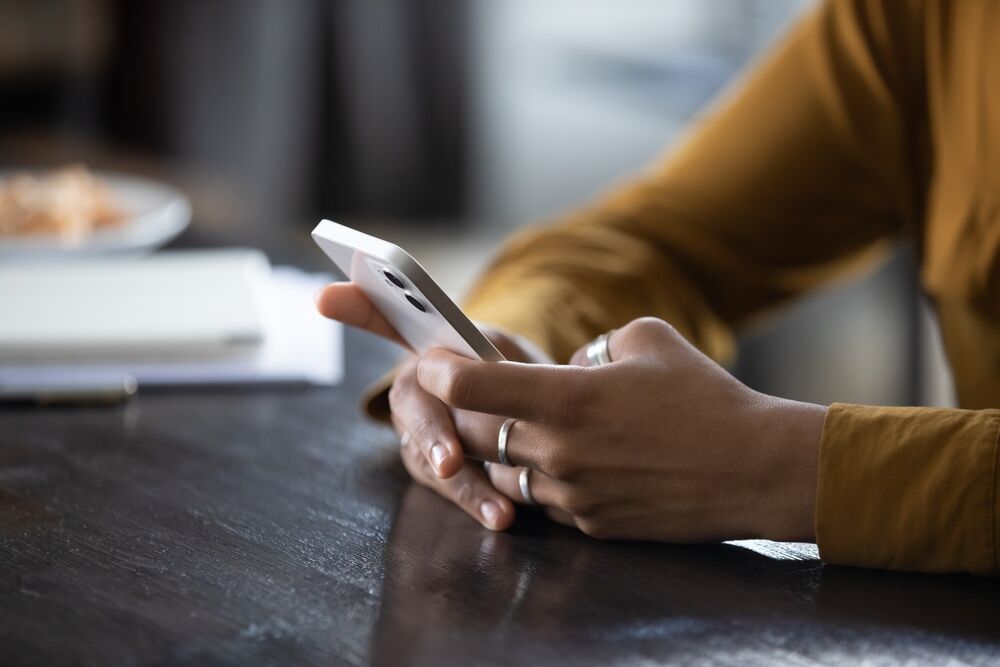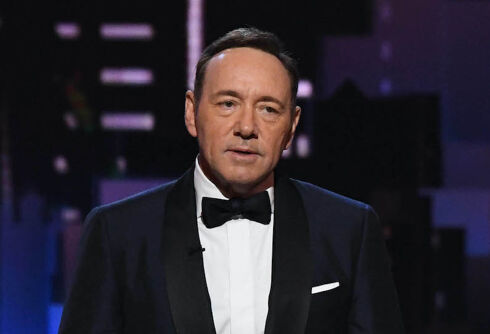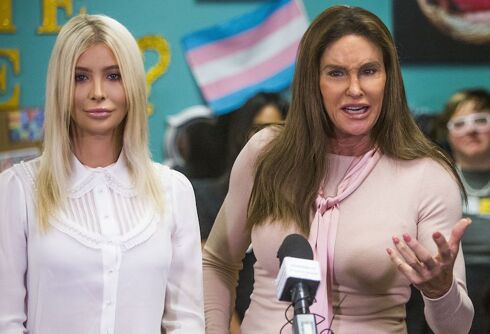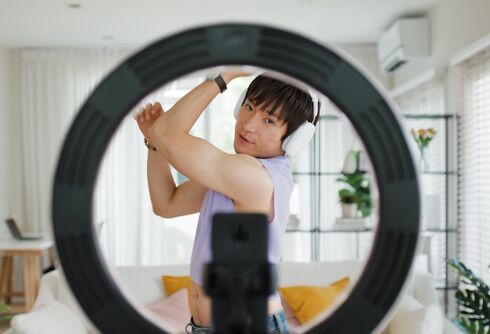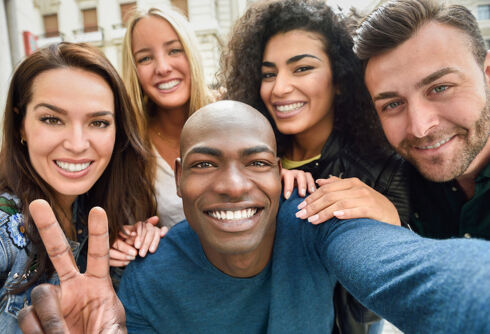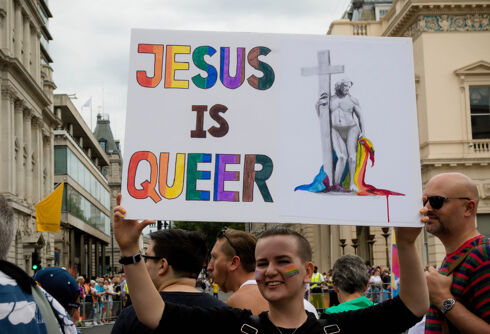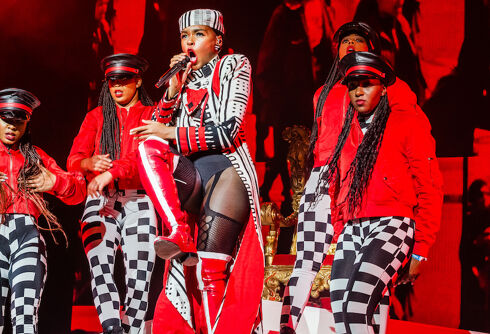“Before we set up our Netflix sesh, I’m feeling like I should tell you that I’ve really enjoyed hanging out with you—I think you’re so smart, interesting, and caring—but I’m not really feeling a spark. I’m totally cool with hanging as friends, though!”
I’d been about to go on a third date with the woman who’d sent me this text. A few weeks prior, we’d had our first date. Having learned by then of the crapshoot that online dating could be, I’d gone into it knowing close to nothing about her. I’d decided it was important to show up to dates with a completely open mind and zero expectations.
I came out of it pleasantly surprised.
Kitschy relics surrounded us as we drank our greyhounds inside a whimsically decorated bar. We talked about how our parents had met, 90s boy bands, and at what age we’d had our gay awakening—standard conversational fodder for LGBTQ millennial dates.
Never Miss a Beat
Subscribe to our newsletter to stay ahead of the latest LGBTQ+ political news and insights.
Somewhere between an exchange of recs for queer movies, books, and podcasts, my date called me cute and offered to buy me another drink. At the end of the night she asked me out on another date.
Texts in between the first and second kept my excitement alive.
COVID was beginning to raise concern for the country and the world at large when we met for the second time. During it, while a fire crackled next to us, we’d talked for hours about mountain boarding, her four bikes, and how cool it would be to live in a tree like the Berenstain Bears.
I biked home with a smile on my face. She texted me saying she’d had a nice time too and invited me on a third date.
So I allowed myself to indulge in just a tiny bit of fantasizing. As the world came grinding to a bleak halt, the thought of having someone to cook and watch Netflix with had offered a small shred of comfort. A little bit of light in a bleak situation. A possibility of some relief from the angst clouding over these unprecedented times of heightened collective stress.
The morning I received that text from her, we were supposed to meet for the date later that night.
As my brain digested it, I felt my heart drop from my chest down into my stomach. My housemate asked me a question, but I could only nod hollowly at them in response. It was a disappointment that only added to the bleakness of that day (the first of shelter in place).
I’d read texts like these before, or some variation of the sort. Sometimes after one date, other times after two or three. Still other times I’d received radio silence, despite the person saying “We should do this again sometime!” at the end of the night. And though I too had sent texts like these, usually it was after a first date, or maybe a few dates where it was clear there wasn’t much there on a physical, mental, or emotional level.
Dating is inherently risky and vulnerable, and even the healthiest of people face rejection at some point or another. But as a person with chronic illness, it’s hard not to personalize, or wonder whether the outcome would have been different if I were symptom-free. “Spark” is an energetic concept, so I question how much symptoms like brain fog or fatigue affect it.
The climate makes me feel like I have to perform. It feels similar to Uber, Task Rabbit, and other on-demand delivery platforms. People seem to move on as soon as they notice a flaw, goaded by the culture of instant gratification and shortened attention spans.
With this in mind, my worry as someone with fatigue, quiet moods, and the occasional need for personal space is that as soon as those symptoms manifest, the person will lose interest. Our interactions will feel, as I’ve heard so many refer to it, flat. They’ll get bored and leave—due to “lack of spark.”
Because of this I often feel pressure to put forward my best, most animated self. Like there’s risk that comes from letting someone see me in one of my lethargic or foggy-headed moods. And it takes work to be constantly on.
I worry that even if the spark is there initially, it will dissipate in little time. Reminders will surface, of all else that is out there. And just as quickly as it formed, the interest will snub out.
In addition to this, dating as a person with chronic conditions also brings up for me the question of how soon to disclose them.
Other questions that come up:
What if they feel limited by me? What if I hold them back?
What if they want to spend more time with me but I’m having a pain flare and know that I’ll be more irritable around them, which might push them away?
What will it be like when I’m not always in a mood that’s happy and cheery? Or when my body weighs me down like a bag of bricks and my brain feels like a broken-down car with a hissing engine (some days the tinnitus in my ear is so loud, this is what it feels like)?
What happens when they invite me on a long, activity-filled weekend but I tell them I can’t go because I don’t have enough spoons, and they just think I’m not fun or don’t have an adventurous spirit?
All are questions that those with chronic illnesses might ask.
I feel like I see this in people’s profiles a lot: “I want someone who’s active. Someone who’s got a lot going on in their life.”
Other spoonies I’ve talked to struggle with people misunderstanding them. The misconceptions are frustrating because I know I’m not “anti-fun”—I love taking part in activities like kayaking, music, comedy shows, concerts—but in moderation. I need to have the energy, and to balance those activities with introverted, restorative ones, because they take spoons. I can’t do them back to back, the way I did when I was younger.
Being diagnosed with Celiac in October of 2020 added another layer to these doubts (at least initially). I worried about the impact it would have on my dating life. I wondered if the diagnosis would “demote” me. Whether it would be a subtraction from my bucket of whatever dating currency remained. I’ve joked before that we live in a gluten-normative world, with non-Celiacs as “the Wheat Majority.”
I’d read things such as how a 2018 survey “found that more than 40 percent of people say they would be ‘reluctant’ to date someone who avoids gluten because they perceive gluten-free eaters as ‘high maintenance.’ The emotional burden of the gluten-free diet can become compounded if your date loves to eat gluten.”
Many believe Celiacs to be high-maintenance and nit-picky—even though we’re just trying to protect our health, to the best of our ability. Celiacs are reminded of our lower-tier status in various ways (many subtle, others not so much)—from jokes about gluten-free eaters being “pussies” to writers and comedians using special diet as synonymous with annoying.
Still, as tempting as it is to blame society and its quick fix, instant gratification, hyper-extroverted culture for my dating insecurities, there’s only so far I can take that. All we can control are our own beliefs, behaviors, and attitudes.
Here’s what I’ve learned to help make dating easier as a person with chronic illness.
- Coming up with alternative explanations for the rejection.
There’s no way to say how much what I’ve outlined reflects the overarching reality because there are infinite reasons why someone might not feel a “spark.” Sometimes it’s a genuine personality mismatch, or incompatible values. Other times, it’s not even personal to you—a person’s past trauma could even be getting in the way of their feeling sparks with anyone.
For instance, one woman I dated for a bit said she associated relationships and attraction with perpetually bidding for another person’s attention.
During our final call, she told me she was attracted to the feeling of pursuing and the anxiety of waiting to hear back. She’d dated a series of partners whom she felt were never truly that interested in her. She told me she felt “very calm” with me and like she could be herself. She said I didn’t do anything wrong.
An article in Your Tango outlined some of the psychology behind this: “If your romantic past was like a rollercoaster, stability may feel “boring.’ People with a more anxious or activated attachment style might be uncomfortable in ‘safe’ relationships that provide security because they’re used to chaos.”
Back in my early 20s I dated a woman I’d been very interested in the first date or two, but my attraction fizzled out after a few dates. At the time I couldn’t understand why, but I now question whether it at least in part stemmed from my own unhealed insecure attachment style.
- Get offline, show “the real me” sooner rather than later.
Sometimes, lack of spark can also be because online profiles make it easier for people to project their preferences onto each other. You might spend weeks or months writing back and forth only to eventually find that the in-person chemistry didn’t match the expectation.
As an article in Conscious Lifestyle Mag put it, “Evidence shows that we start constructing our idea of who another person is on first contact. Just one picture on Tinder, one tweet we find hilarious or off-putting, and we think we know who the person is.” As The Bachelor proves, no activity is more ruled by fantasies than dating.
When communicating on the apps, it’s easier to fall into a relationship with an idea of a person that your mind’s built up, more than with that actual person. Seeing only their positive light—their curated side, never their shadow—allows you to idealize them. It also gives you an illusion of a spark that you might not feel once you actually meet.
The romantic in me wonders, If two people could fall in love in You’ve Got Mail without ever seeing each other, why can’t it happen in this day and age? Especially with pictures of the other person. You at least know what they look like; you’re not drawing from completely disembodied words on a screen.
As an article in The Latch put it: “While the physical closeness might be lacking through the use of a dating app like Bumble, intimacy doesn’t just involve touch. According to Lysn psychologist Nancy Sokarno there are four types of intimacy and the majority of those don’t involve touching. Emotional, mental, spiritual, and physical are the types of intimacy needed to develop and foster a sense of connection in any type of relationship,’ Sokarno told The Latch. ‘So three of those are all based on communication and don’t require physical touching.’”
(Or is it unanimously agreed upon that You’ve Got Mail was unrealistic? Maybe a 2023 rewrite would be for them to meet and Meg Ryan to say, “oh… you know I actually don’t feel a spark, but we could be friends”).
Possible or not, there are still plenty of people who may show a lot of interest in your profile only for that interest to fizzle once you actually meet (I’ve been on the receiving end of this a few times and began to treat it like a pink flag when people started displaying attachment to me prior to meeting). Social media sets us up a bit. Very rarely are people intentionally trying to deceive each other—but the gap between expectations and reality is present and plays a role nonetheless.
For this reason, I now spend minimal time messaging. The sooner we can meet and gauge in-person connection, the better. I also try to make my profile align as closely with reality as it can. I minimize filters, knowing whatever flaws I’m trying to hide, they’ll see once we meet in person. Better they accept me as I am than under false pretenses only to reject me later on.
I’ve learned to be specific in my profile description, going for niche over mass appeal. For instance, I put down that I’m an INFP, which prepares people mentally. They might expect me to be an extrovert from the pictures I’ve chosen, or because they prefer extroverts and brains fill in ambiguity with their own personal preferences. Specifying interrupts that process.
I also try to either meet right away or have a phone call, since voice plays a role in attraction. I want people to know right away if that’s a dealbreaker for them.
- If the rejection did have something to do with my health status, to think about it in a different, kinder way.
I’ve realized I just have to believe there are daters out there who accept people with chronic illness as they are—even if we might not be able to entertain them 24/7, climb mountains at their side, or exude constant cheery energy.
The ones who’d reject me for my health symptoms simply aren’t compatible. It’s okay to be legitimately content with a somewhat minimal social life and to not be constantly looking to meet new people. I can find someone who also wants that—another introvert or person with chronic illness who has similar needs.
It helps to remember that what people look for in a partner shifts as the years pass changes. More of us develop chronic conditions as we get older. We all slow to some extent. Few fifty-year-olds possess the same boundless energy that sent them up mountains and powered them through interpersonal marathons at twenty.
Priorities shift; so does what we each want from life. Those same people who rejected you in your 20s might reincarnate into different versions of themselves a mere ten years later. Patience and acceptance of differing needs increase with older age as well.
As for my conditions, I don’t hide my Celiac. Nor do I lead with it. Though I don’t necessarily think it’ll be a selling point to people who don’t have the condition themselves, I also don’t think that for the right person, it would be a turn-off.
I notice I’ve become more discerning these days. It’s easier for me to say no or pass when confronting options. I know on a logical level that Celiac doesn’t make me a less attractive partner. Rather, it gives me the tools to screen out incompatible people— by equipping me with a newer lens of discernment.
I’d like to think that in the long run, maybe all the fruitless dates, “no spark” texts, and rejections, disheartening as they are, take us closer to something. They take us closer to the person who, even with all the freedom to choose differently, and despite the hundreds of matches at their literal fingertips, decides on you— and vice versa. Both of you feel it in your bones that the other is it — and neither of you will question it.
Dating with chronic illness feels vulnerable and challenging—but those people are out there. It’s just a matter of finding them.
And until I do (or even if I never), I’ll continue to embody that partner I’ve wanted someone to be for me.


